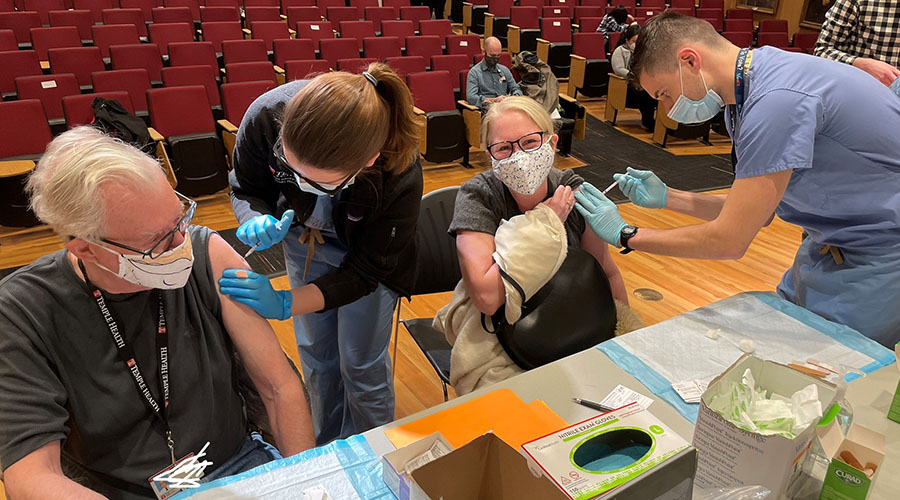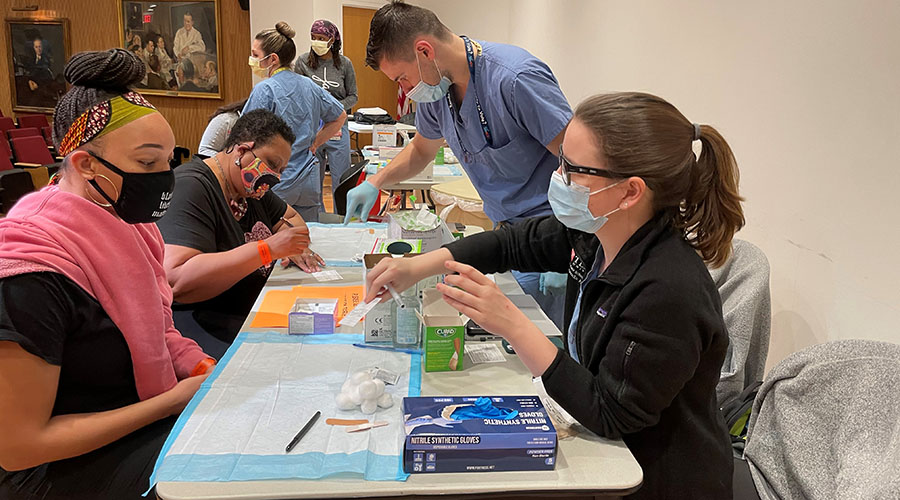
Last spring, as COVID-19 was beginning to exact its devastating toll on Philadelphia, Christopher Rakay volunteered to help transport patients at Temple University Hospital.
“It was one way I could help,” says Rakay, who was then a third-year medical student at the Lewis Katz School of Medicine (LKSOM).
Rakay was involved in something then that continues to resonate with him today. He and another transporter were asked to help move a patient from the COVID-19 ICU to the CT scanner, along with a nurse and a respiratory therapist. During the move, the patient’s pressure plunged. The nurse and therapist stabilized the patient and eventually the four of them moved him to the scanner, but it required an enormous effort.
“This is not what we’re used to seeing: so many people so sick and requiring so much intensive care from healthcare providers,” Rakay says. “This is not something that can be brushed off. It’s a hard time for a lot of people.”
Students Respond
From the onset of the pandemic last March, LKSOM students have responded heroically. They’ve organized PPE drives, created fabric masks, tutored children from the surrounding community, and even provided childcare for some Temple physicians while they worked on the pandemic’s frontlines. All of that was done on top of the volunteer opportunities offered throughout the health system, for which the students signed up quickly and enthusiastically.
And yet, Rakay says, “a common sentiment among the students has been, ‘I wish I could have done more.’”
So, when Temple Health began vaccinating its staff with the COVID-19 vaccination in mid-December and sought student volunteers from across the university to help with the effort, Rakay and many others didn’t hesitate.
“What I want to do is help people and alleviate disease and suffering,” he says. “This was a prime opportunity to do just that.”
It helped that the call went out as Rakay, now a fourth-year medical student and father of two children, was in a lull in his academic schedule, during which he was interviewing for a psychiatric residency.
Miranda Haslam, a fellow fourth-year medical student at LKSOM, also took advantage of the timing, volunteering at least a couple of times a week for the first month of the vaccination rollout.
“I do it because I want to be a part of something bigger than myself,” Haslam says. “I get a lot of satisfaction from giving back, especially as my time as a medical student at Temple is ending. I’ve been able to be on a team that includes people from throughout the health system, many of them people I hadn’t worked with before. It’s really helped me feel like I’m part of this community.”

Making a Difference
On December 16, Temple Health opened four COVID-19 vaccination centers, one each at TUH-Main, TUH-Jeanes, TUH-Episcopal, and Fox Chase Cancer Center.
Tony Reed, MD, MBA, CPE, Temple Health’s Executive Vice President and Chief Medical Officer, estimates that between 35 and 40 volunteers and healthcare providers staff the centers. Together, they’ve administered 1,900 doses of the Moderna and Pfizer-BioNTech vaccines per week to Temple Health employees in accordance with the guidelines for Pennsylvania’s first phase of COVID-19 vaccination.
Student volunteers from across the university, not just medical students, have participated in the various aspects of the vaccination, from checking in staff and asking a few basic screening questions to scheduling follow-up appointments for the second dose. (Both the Moderna and Pfizer vaccines require two separate doses.) However, only nursing and medical students are permitted to administer the vaccines.
Rakay estimates that he vaccinated about 40 people over the first two weeks in January. Michael Creager, another fourth-year medical student who’s planning to go into internal medicine, says he administered more than 100 doses over five days at the main campus.
“We love having students of all backgrounds and disciplines who are so willing to help every step of the way. I believe that having students involved benefits us all,” Dr. Reed says. “At all times they are being proctored, taught, and supervised by attendings and staff nurses.”
As eligibility for the vaccines expands over the coming months, Dr. Reed says the sustainability of Temple’s vaccination program is not solely dependent on student volunteers. Though they’ve certainly helped ease the burden so far.
While there’s still a long way to go—some estimate it could take several months to a year to vaccinate all willing Americans—the vaccines are widely regarded as a means to the end of the pandemic and a return to normalcy. The chance to deliver on that kind of promise will continue to compel even the most time-crunched medical students.
“This was a longtime coming. The world’s been struggling for almost a year now, and I’ve seen the devastating effects firsthand,” Creager says. “These vaccines are a sign of hope. I’m excited to be a part of helping to get them out to the Temple community. It’s all hands on deck.”
